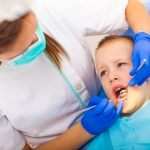Dental implants are a popular treatment option for adults who have lost teeth due to injury, decay, or other reasons. However, dental implants for children are a much more complex issue. While dental implants are a viable option for adults, it is important to carefully consider the risks and benefits before deciding whether a child is a good candidate for dental implants.
Why Might a Child Need a Dental Implant?
A child may need a dental implant if they have lost a tooth due to injury or decay. In some cases, a child may also be born without a tooth, which can cause problems with speech and chewing. Dental implants are designed to replace a missing tooth, providing a permanent solution that looks and functions like a natural tooth.
Risks and Benefits of Dental Implants for Children
Dental implants for children carry certain risks and benefits that should be carefully considered before making a decision. Some potential benefits of dental implants for children include:
Improved oral health: Dental implants can help prevent further decay or infection by filling in the gap left by a missing tooth.
Improved appearance: A dental implant can help restore a child’s smile, improving their self-confidence and overall appearance.
Improved speech and chewing: Missing teeth can affect speech and chewing, but a dental implant can help restore normal function.
However, dental implants also carry certain risks that should be considered, including:
Growth and development: Children’s jaws and facial bones are still growing and developing, which can affect the placement and stability of dental implants.
Risk of implant failure: Dental implants can fail if they are not properly placed or cared for. In children, this risk may be higher due to the ongoing growth and development of the jawbone.
Cost: Dental implants can be expensive, and may not be covered by insurance. The cost of ongoing maintenance and replacement may also be a concern.
Is Your Child a Good Candidate for Dental Implants?
If your child has lost a tooth, it is important to consult with a dental professional to determine whether a dental implant is the right treatment option. Factors that will be considered include the child’s age, overall health, and the condition of their jawbone.
In general, children may be better candidates for dental implants if they are older, have finished growing, and have a healthy jawbone that is fully developed. However, this will vary depending on the individual child and their specific needs.
Alternatives to Dental Implants for Children
If a dental implant is not a viable option for your child, there are other treatment options to consider. These may include:
Partial dentures: Removable partial dentures can be used to fill in gaps left by missing teeth.
Orthodontic treatment: In some cases, orthodontic treatment may be used to move teeth into the space left by a missing tooth.
Space maintainers: A space maintainer is a device that is used to keep the gap left by a missing tooth open, preventing other teeth from shifting into the space.
In conclusion, dental implants for children are a complex issue that requires careful consideration. While dental implants can be a viable option for some children, there are risks and benefits to be considered. It is important to consult with a dental professional to determine the best treatment option for your child’s individual needs.



